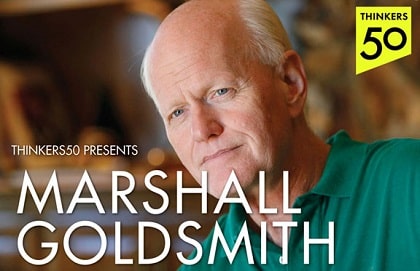INTERVIEW: Dr. Marshall Goldsmith on Becoming a Better Leader
There’s a lot of information available to us about leadership and being an effective leader. I wanted to share with you some resources that I find useful from a person whose work I respect immensely.
Years ago, I had the opportunity to hear Dr. Marshall Goldsmith speak about leadership. Dr. Goldsmith has been rated the number one executive coach globally as well as one of the top ten most influential business leaders in the world. Harvard Business Review rates him as the “World’s #1 Leadership Thinker.” He’s the author of several books including one of my faves, “What Got You Here Won’t Get You There”.
One of the qualities that sets Dr. Goldsmith apart from others in the leadership space is his belief that he should “give everything away.” I asked him where this belief came from and he told me a story about growing up in a small town in Kentucky. At one point, he was a fundraiser for the March of Dimes. He would go door-to-door asking for contributions and if someone gave him money, he was supposed to give them a loaf of bread to thank the person for their donation. Over time, he discovered that he was far more effective at fundraising when he gave people the loaf of bread first. It helped him realize the importance of building a positive brand.
Dr. Goldsmith also believes it is perfectly acceptable to modify his material. “I believe someone should only do what I say if it works for them. Learning should be about what works for a person. We spend too much time critiquing others. It’s a waste of time. Use your time to find out what works for you. If I have a model with six steps and you like five of them…then use five.”
In the spirit of freely sharing his expertise, Dr. Goldsmith has just launched a new weekly video blog, so I asked if he would share some insights with us.
Tell us about the Thinkers50 Video Blog. What is it? Why did you decide to use video as the medium?
I came up with the idea after several chats with my friend Elliott Masie, an expert on the subject of learning and technology. He said to me that ‘the author of the future is a video producer’. The Thinkers50 Video Blog allows me to share some of my material from the past as well as from the new book I’m working on ‘Triggers’.
Video is a new way to share material. People like short video (in the 2-5 minute range). It’s easy to digest. People don’t have time to digest dozens of things but they can find time to learn one thing a day.
Today, leaders get advice from all directions. Some of that advice is good and some is well….not very useful. How can a business leader find good, valuable resources?
Find people who are highly regarded in their industry or subject matter and branch out from there. No list or ranking is perfect but, they are also not stupid. Lists have been vetted in some fashion and are a great place to start.
In your bio, it mentions that you spent over ten years on Peter Drucker’s advisory board. You’ve been working on the subject of leadership for a long time. What would you say is the number one skill business leaders need to focus on?
Leaders need to do three things: Ask, Listen, and Learn. Leaders should be a role model for these three things. I believe it’s a sign of weak leadership to ask others to do things that you do not model yourself. So no one should tell others to continuously improve if they’re not demonstrating continuous improvement themselves.
In my article [PDF], ‘Leadership is a Contact Sport’, I share research that supports the ‘Ask, Listen, and Learn’ philosophy. It’s something every leader can do and it doesn’t cost any money.
Lastly, if companies can only afford to make one investment into their leadership teams, what should they do?
High potential employees represent the future of the organization. Investing in their growth and development is an investment in the company. When they get better, the whole company benefits. I’m all about follow-up and measurement. ‘Are we seeing results?’, ‘Are things improving?’ That creates change. Companies today invest in a lot of programs, slogans, etc. Those things are easy to understand but the reality is, change is hard. It reminds me of something Governor Arnold Schwarzenegger said, ‘Nobody ever got muscles by watching me lift weights.’ Leaders must be committed to making change happen for themselves.
[Tweet “High potential employees represent the future of an organization.”]
My thanks to Dr. Goldsmith for his time and sharing of these wonderful resources. If you are looking for more of Dr. Goldsmith’s work, be sure to check out his library of free resources and subscribe to the weekly Thinkers50 Video Blog.
P.S. For leaders who are looking to own their professional development and create change, Dr. Goldsmith shared with me an activity that has proven results. It’s called ‘Questions that make a Difference Every Day [PDF].’ It helps leaders stay focused on what’s important and, when used regularly, it works! Every day, you challenge yourself by answering questions that represent behaviors we know are important but easy to forget. Each answer is recorded on a spreadsheet. You can share your results with a mentor or coach. Or keep them for personal reflection. If you’d like to do this activity, here’s Dr. Goldsmith’s spreadsheet to get you started.
0